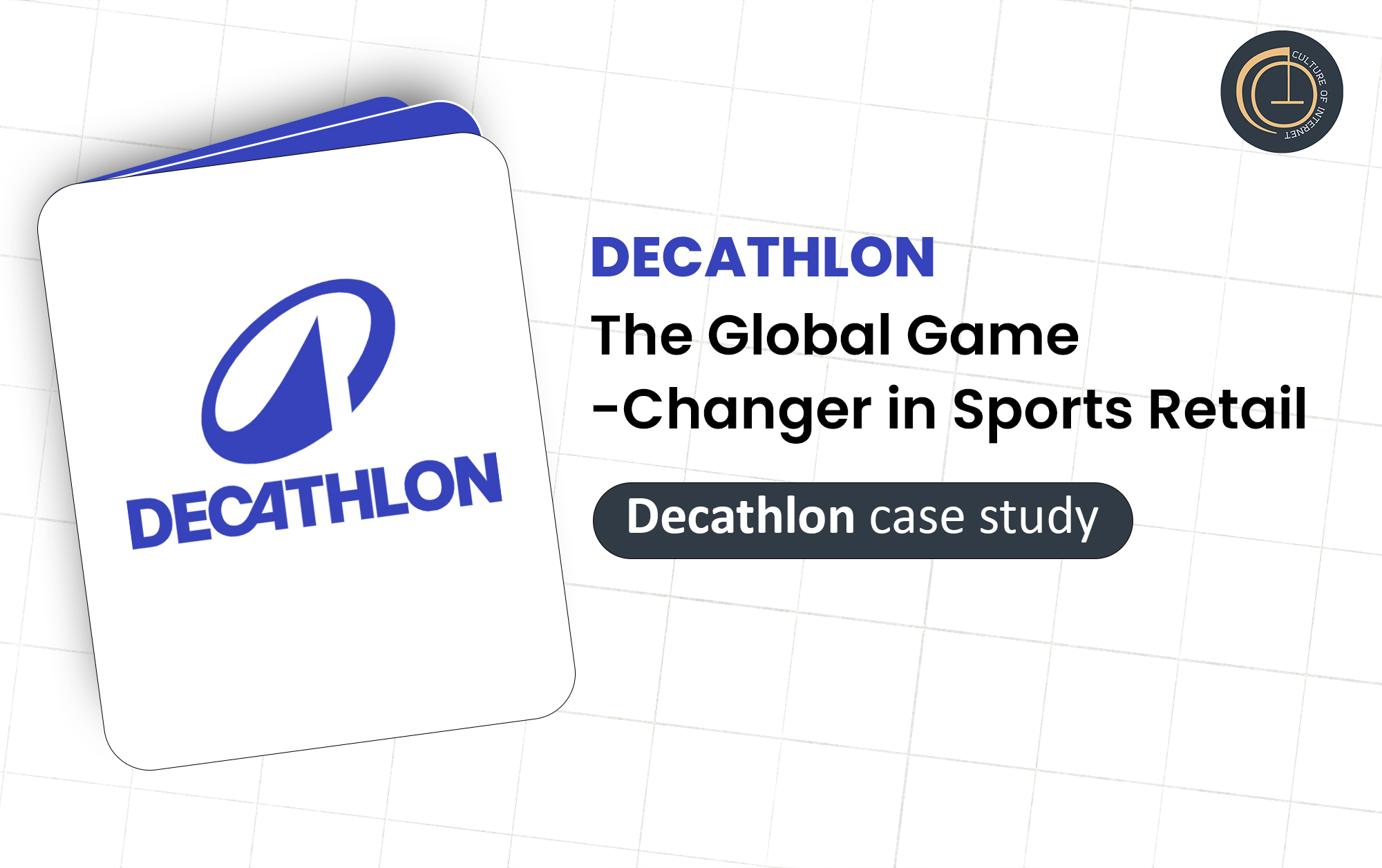Origin : Company Overview
A French Vision to Democratize Sports The story of Decathlon began in 1976, in Lille, France, when Michel Leclercq had a revolutionary idea: to make sports accessible to all. At the time, sports gear was often expensive and fragmented across multiple niche stores. What if there was a single destination where people of all ages, incomes, and skill levels could get everything they needed under one roof — and at affordable prices?
That question led to the founding of Decathlon, a sporting goods retailer unlike any other. It began as a simple store with the goal of offering a wide range of products for different sports — not just for elite athletes, but for everyday people.
The name “Decathlon” reflects its core identity — a mix of 10 sports, symbolizing inclusiveness and diversity. What started as a single store has today become a global brand, present in more than 70 countries, including a rapidly growing footprint in India.
Position
The World’s Largest Sporting Goods Retailer Decathlon is now the world’s biggest sporting goods retailer, surpassing traditional competitors like Nike, Adidas, and Puma in terms of store count and variety of offerings.
-
In India : Decathlon has carved out a unique niche. While other sports brands focused on performance gear or branded shoes, Decathlon focused on utility, affordability, and access. As of 2024, the brand has:
-
Over 100 physical stores across Indian cities and growing towns.
-
A booming online platform, reaching customers even in remote villages.
-
A loyal customer base ranging from fitness enthusiasts and kids to trekking hobbyists and professional athletes.
-
Decathlon has become the go-to name for sports lovers and beginners alike. Ask any Indian trekker, cyclist, swimmer, or runner — chances are their first gear was from Decathlon.
USP
All Sports. All People. One Roof. Decathlon’s unique selling proposition (USP) is clear and compelling: affordable, high-quality sports gear for everyone, for every sport, under one roof.
-
What sets it apart : In-house brands: Decathlon designs, develops, and sells its own products, eliminating middlemen and reducing costs.
-
Every sport under the sun : Whether it’s hiking, basketball, yoga, scuba diving, or fencing, Decathlon covers 70+ sports.
-
Experience-based shopping : Their massive stores aren’t just for buying — they’re built for trying, testing, and exploring.
-
Value for money : Products are priced to be inclusive, without compromising on quality.
-
For a price-conscious market like India, that model was game-changing.
Existence
Nearly 50 Years of Global Impact From its humble start in Lille, Decathlon’s journey has been remarkable. The brand focused not just on expansion but reinventing how sports retail works.
Key milestones :
First store opened in France.
Expanded to Germany, the UK, and Spain.
Entered the Indian market.
Launched online shopping in India.
Strengthened its omni-channel model during the pandemic and expanded in Tier 2 and Tier 3 cities in India.
Today, Decathlon operates 2,000+ stores in over 70 countries, employs over 100,000 people globally, and continues to grow.
In India alone, Decathlon has become synonymous with budget-friendly, reliable sports gear, particularly for middle-class families and college students.
Power of Network : From Cities to Small Towns
Decathlon’s success is rooted in its network strength — a combination of physical stores, logistics, supply chains, and digital touchpoints.
Retail Network
-
Decathlon has set up mega-format stores — often spread across 30,000 to 40,000 sq. ft. — in cities and towns across India. These stores double as:
-
Product test zones (e.g., bicycles, basketball courts, camping tents)
-
Mini sports complexes hosting local events
-
Community hubs for sports workshops and events
-
Their strategic store placement — near expressways, college towns, and developing cities — helps them attract large and diverse crowds.
E-commerce
The Decathlon India app and website serve customers across 29,000+ pin codes, with robust logistics that ensure delivery even in smaller towns.
During the COVID-19 lockdowns, Decathlon’s digital channels kept the business thriving, and the brand invested more in warehousing and delivery optimization.
Supply Chain
Decathlon has built a strong local supply chain in India. Over 60% of products sold in Indian stores are manufactured locally, helping reduce costs and import dependencies.
Diversification: More Than Just a Sports Store
Decathlon is not just about sportswear. It has diversified extensively, positioning itself as a complete sporting ecosystem.
In-House Brands
Instead of selling external brands, Decathlon developed over 30 internal brands tailored for specific sports, such as:
-
Quechua (Trekking and hiking)
-
Kalenji (Running)
-
Domyos (Gym and fitness)
-
Nabaiji (Swimming)
-
Artengo (Tennis)
-
Btwin (Cycling)
-
Tribord (Water sports)
-
Kipsta (Team sports like football)
Each sub-brand is focused on deep R&D, innovation, and price-efficiency, allowing customers to explore gear without overpaying for a label.
E-commerceFitness Services
Decathlon has started offering online workout programs, local community events, cycling tours, and fitness training sessions — making it a holistic wellness brand.
-
Receive personalized recommendations
-
Join loyalty programs
-
ness sessions or gear rentals
-
Track orders and product warranties
-
Book fitWith the Decathlon app, customers can:
Collaboration & Partnership
Strategic & Social Decathlon’s growth is powered not just by innovation but by strategic partnerships, including:
-
Local Manufacturers : - To meet its massive demand, Decathlon partners with 200+ Indian manufacturers, contributing to India’s Make in India mission and keeping product costs low.
-
Government & NGOs : - Decathlon partners with local NGOs and schools to promote physical education, especially in underprivileged communities.
-
Startups & Fitness Apps : - In recent years, Decathlon India has collaborated with fitness platforms and cycling communities to organize online challenges, fitness fests, and promotional campaigns.
-
Sustainability Organizations : - Globally, Decathlon partners with groups focusing on recycling, eco-packaging, and carbon neutrality, including textile recycling alliances and sustainable farming for cotton.
Strategies Followed :
Innovation with Affordability Decathlon’s strategy blends product innovation, vertical integration, and community building. Here’s what makes their approach unique:
-
Vertical Integration : - Decathlon controls the entire product journey — from design and manufacturing to retail and service — allowing them to:
-
Lower costs
-
Innovate faster
-
Ensure quality control
-
-
Local Manufacturing : - In India, Decathlon uses domestic factories to produce more than half its products. This cuts import costs and supports regional economies.
-
Customer-Centric Design : - Each product undergoes customer trials and field testing. User feedback shapes product updates, creating a loop of constant improvement.
-
Omni-Channel Strategy : - Decathlon’s retail+online model is perfectly blended. Customers can:
-
View products online and buy in-store
-
Return online orders at physical stores
-
Book rentals and events via app
-
-
Sustainability Focus : - Decathlon aims to have 100% of its products eco-designed by 2026. From recyclable materials to energy-efficient logistics, the brand is deeply committed to going green.
-
Price Transparency : - Ever noticed the transparent pricing tags at Decathlon? They break down material cost, R&D, logistics, and margin — building trust and clarity with customers.
Problems Faced
Not All Smooth Sailing Like every brand, Decathlon has had its challenges — especially while scaling in diverse markets like India.
-
Import Restrictions : - Some of its premium sports gear still relies on imports, making pricing sensitive to duties and global logistics issues.
-
Real Estate Costs : - Their large-format stores require huge retail spaces, which are expensive to maintain in urban areas. Real estate challenges have delayed store launches in some metros.
-
Competition : - E-commerce giants like Amazon and Flipkart are selling sports gear from multiple brands, pushing Decathlon to enhance its online offerings.
-
Post-Pandemic Demand Shifts : - The COVID-19 pandemic disrupted supply chains and altered consumer behavior. The company had to quickly shift to online-first, which came with learning curves.
-
Limited Global Brand Visibility : - Unlike Nike or Adidas, Decathlon is less of a “fashion statement.” This sometimes affects appeal among premium or style-driven consumers.
-
Environmental Concerns : - Although Decathlon is working toward sustainability, fast production and volume manufacturing have drawn scrutiny, especially in Europe, for environmental impact.
Stats That Matter (2024–2025)
-
Founded: 1976, Lille, France
-
Founder: Michel Leclercq
-
Global Presence: 2,000+ stores in 70+ countries
-
Global Employees: 105,000+
-
India Presence: 100+ stores
-
Product Range: 5,000+ items across 70+ sports
-
E-commerce Reach in India: 29,000+ pin codes
-
% of In-house Brands: 90%
-
India Manufacturing Contribution: 60%+ of products
-
Annual Global Revenue (2023): €15 billion+
-
Annual India Revenue (2023): ₹4,200 crore+
-
Sustainability Goal: 100% eco-designed products by 2026
-
Customer Satisfaction: NPS score above 70 in India
Conclusion
Decathlon’s Leap from Retailer to Movement Decathlon is more than just a store — it’s a movement that inspires people to move. Whether you’re a school kid picking your first badminton racquet or a serious marathoner shopping for hydration vests, Decathlon speaks your language — of affordability, quality, and passion.
In India, Decathlon has democratized access to sports, breaking the idea that good gear is only for the rich or the pro. It has empowered millions to start running, hiking, playing, or exploring their fitness goals — with confidence and without burning a hole in their pocket.
And as it looks to the future — with green goals, digital integration, and community partnerships — one thing is certain:
Wherever there’s a sporting dream, Decathlon will be there to support it.
Explore Our Comprehensive Marketing Strategy Course
Join our in-depth course to master Decathlon India's marketing strategies, learn from expert case studies, and gain actionable insights to apply in your own business or career.









